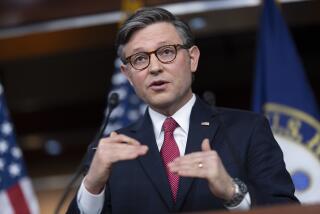Funding for U.N. Force Proves Tricky : Balkans: One option Administration may use would circumvent Capitol Hill opposition with ‘voluntary’ aid.
- Share via
WASHINGTON — Caught in a bleak middle ground between its most important NATO allies and the Republican-controlled Congress, the Clinton Administration is searching for a way to help finance an allied rapid-reaction force in Bosnia-Herzegovina despite growing opposition on Capitol Hill.
State Department spokesman Nicholas Burns said one option under consideration is a “voluntary fund” that could attract contributions from the United States and other governments while finessing the congressional budget process.
The objective is to demonstrate U.S. support for a 12,000-member force--made up primarily of British, French and Dutch troops--intended to give badly needed muscle to the feeble U.N. operation in the Balkans.
Britain, France and the Netherlands proposed the rapid-reaction force to invigorate the U.N. peacekeeping operation. Officials of those governments have made it clear that they expect money from Washington to make up for the Administration’s refusal to send U.S. troops.
But congressional leaders are ready to write off the U.N. operation entirely, calling for its removal from Bosnia and for the United States then to give arms, military training, intelligence and other support to the Muslim-led Bosnian government.
Administration officials admit that their argument was weakened by a letter from Yasushi Akashi, the top U.N. official in the Balkans, to Bosnian Serb leader Radovan Karadzic assuring the rebel Serbs that the rapid-reaction force will be bound by the same rules that have hamstrung the overall U.N. operation.
Burns said Friday that the Akashi letter “would essentially mean more of the same for the U.N. operations in Bosnia.”
He said the letter differs sharply from the U.S. understanding that the force is intended to strengthen the United Nations in carrying out its peacekeeping mission. He said that Akashi should have discussed the matter with the Security Council, which presumably could have required him to rewrite the letter before sending it.
Even before Akashi’s letter surfaced, the U.S. government had sought clarifications from Britain, France and the Netherlands about the role of the new force.
“The more effective that [the main U.N. force] and the rapid-reaction force can be, the broader support for it, I think, we’ll see in the United States,” Burns said.
But it will be a hard sell for the Administration on Capitol Hill.
Burns offered few details on how the proposed voluntary fund would operate, but he made it clear that the objective is to circumvent congressional opposition.
He said Washington might make some of its contribution in the form of services, such as equipment or airlift, instead of cash. That would come out of the regular Pentagon budget.
Although the voluntary plan is the only one the Administration has discussed in public, officials said other possibilities are also under consideration.
The funding controversy is especially embarrassing to the Administration because Secretary of State Warren Christopher offered strong support for the rapid-reaction force when France first proposed it during North Atlantic Treaty Organization meetings late last month, even though the United States did not intend to contribute troops.
Burns said there was a misunderstanding at the NATO meeting because France and Britain apparently came away thinking that the United States would pay about 30% of the bill under the standard U.N. peacekeeping formula. He said that level of support was never a possibility because of congressional opposition.
But the dispute between the White House and Capitol Hill goes far beyond funds.
“The U.N.-led, Clinton-backed policy in Bosnia, wrong from the beginning, has now failed,” Senate Foreign Relations Committee Chairman Jesse Helms (R-N.C.) wrote recently. “We must choose sides. The U.N. mission in Bosnia must withdraw, the arms embargo on the Bosnian Muslims must be lifted--unilaterally if necessary--and the Serbs must be driven from unlawfully conquered territory.”
In Sarajevo on Friday, fighting was reported west of the city, and the Associated Press said Bosnian Serbs held up two aid convoys headed for the city.
Twelve shells struck the U.N. “safe area” of Bihac on Friday morning, U.N. spokesman Chris Gunness said. Bosnian government radio said three people were killed and 12 were wounded.
More to Read
Get the L.A. Times Politics newsletter
Deeply reported insights into legislation, politics and policy from Sacramento, Washington and beyond. In your inbox twice per week.
You may occasionally receive promotional content from the Los Angeles Times.










